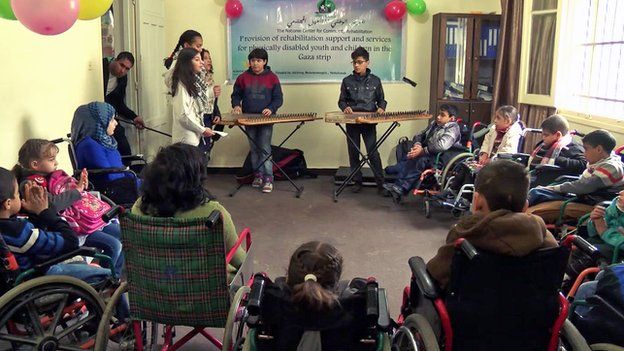Can music help to de-stigmatise disability in Gaza?
- Published

A centre in Gaza City is offering music therapy to children with learning disabilities. Could this help de-stigmatise disability in the region?
The songs blasting from the windows at the National Centre for Community Rehabilitation in Gaza City don't sound like an average musical concert. Children clap along to the music, and adults can be heard encouraging them to keep time.
These songs form the backbone of therapy sessions for children with physical disabilities and severe learning difficulties in this impoverished part of the Palestinian Territories.
Music therapy is scarce in Gaza City but the specialists at this treatment centre are using the unconventional, modern technique to treat the children who attend. Their aim is to help integrate them into a society where disabilities are still very much taboo.
The experts there say they have seen positive results.
"In my experience music is one of the most successful forms of therapy for people with special needs," explains Eileen Audallah, a psychologist at the centre. "It increases self-confidence and helps people to develop ways to express their emotions and feelings."
The pleasure on the children's faces is clear to see; playing music allows them to express themselves and interact with other children - things they don't often get to do.
"I love the centre and the music," one of the children tells me. "I get really happy when I sing. I always say to my Dad that I want to go to the centre and he says, go."
Another of the children agrees: "I had stopped studying but thanks to the sessions I've been able to go back to school. I feel really comfortable with the staff here and I really enjoy the classes. I never miss a session!"
Tough life
Some 1.8 million people live in the crowded Gaza strip, which is just 40km (25 miles) long and 10 km (6 miles) wide.
The tiny territory has been blighted by successive conflicts between Palestinian militants and Israel, which have had serious physical and psychological impacts on the population.
It's estimated that between 126,000 and 270,000 members of the population in Gaza are disabled, according to a 2012 report by the Palestinian Central Bureau of Statistics, and the 50-day conflict last summer has left many more with a long-term or permanent impairment.
Yet despite the high prevalence of people with disabilities in the territory, disabled children are still shrouded in social stigma, and many parents choose to hide their offspring from the prying public eye.
Lubna Nasser, a mother of two, is one of them. "Seventeen years ago I gave birth to twins, both with severe learning difficulties," she says. "Since then my life has been hell. I avoid socialising with family and friends, and some of my neighbours don't even know I have disabled children."
In such an environment, it is easy to see why projects such as the music therapy classes are so important.
The therapy sessions are not limited to music; the children are also given the opportunity to get stuck in to drama, poetry readings and art. In some sessions, even the parents are participating, acting out plays with the children.
"Getting involved with the activities alongside the kids, we see how their self-confidence increases," one of the children's fathers tells me. "It's clear they really enjoy the sessions and start mixing with other children."
The centre's staff hope that such activities will help not only to teach the children something new, but also to teach their parents and society at large how to interact with people with special needs.
But the centre can only cater for a fraction of the demand, and medical facilities in the territory are scarce.
The founders say that demand for this type of treatment is growing, but a lack of investment and opportunities for expansion has prevented the centre from rolling out similar projects elsewhere in Gaza.
"In the last few years, the lack of support for institutions aimed at helping disabled children and those with special needs has really impacted on the kinds of activities that are available for such children," says Wael Abu Razek, director of the centre. "This has of course affected the children we aim these services at as well."
Life in Gaza may be tough, but in this centre at least, the children can still look forward to a little bit of joy.
Follow @BBCOuch on Twitter and on Facebook, and listen to our monthly talk show